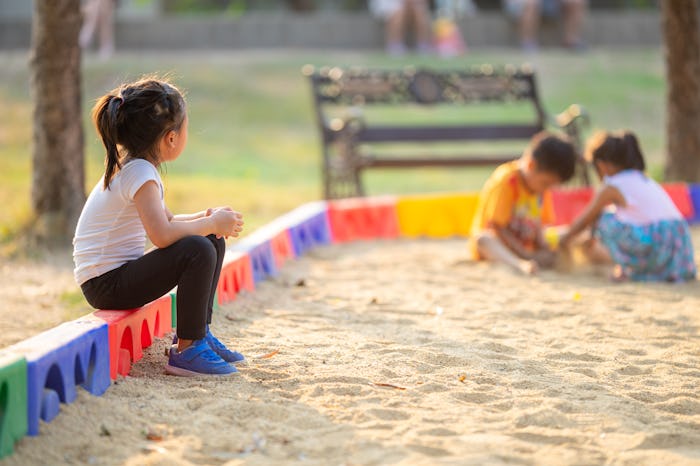Life

Being Shy Is Totally OK, But Experts Want You To Do This To Help Your Kid Socialize
Parents with shy children know how difficult it can be to leave their upset kiddo at school, see that they’re uncomfortable at play dates, or hear they have trouble making friends. Knowing how to help a shy child socialize is an important part of parenting one, and ensures your little one learns to get comfortable in social situations. Even though there’s nothing wrong with shyness, experts say children need to know how to work around it.
Maureen Healy, PhD, author of The Emotionally Healthy Child, tells Romper in an interview that shy children are those who are “inherently uncomfortable in groups,” and may be described as introverted, quiet, or hesitant. She says parents need to help their shy children learn to manage the trait, otherwise it can take on a life of its own.
“Being shy is a personality trait and not necessarily something you outgrow,” Healy says. “Shyness is something you learn how to manage. Social anxiety occurs when a shy child hasn’t learned how to navigate or manage their emotions yet, so say they walk into a mall and there’s a lot of nervousness and anxiousness to buy things. They don’t yet know, ‘Where do I begin and end?’ to manage that experience.”
Parents may struggle with how much to push their child into socializing if they know they’re shy. What if you make them uncomfortable? And is that OK?
“There’s no formula because every child is different, but shy children need encouragement,” says Healy. “It may take them five visits to the dentist to sit in the chair and get comfortable; some may just need a buddy to go with them. A parent’s role is to help navigate them through these situations, and being uncomfortable is something people try to avoid, but you have to learn to embrace that discomfort so you can navigate through it.”
Ensuring your kiddo can tackle life’s uncomfortable situations sets them up to be healthier and happier. Randy Thornton, M.D., pediatrician at Jacksonville Pediatrics and Wolfson Children’s Hospital of Jacksonville, tells Romper in an interview that his priority for shy children is making sure they’re content and not showing signs of anxiety.
“It’s about quality of life,” he says. “Some kids are perfectly content doing things by themselves. You want them to have friends, but some are just going to be quieter and be wallflowers. I would get concerned if they’re not doing well in school, not wanting to go to school, or if they’re having vague complaints like headaches or stomachaches. Kids with anxiety often don’t want to go to school, while shy kids get there and don’t want to participate. If they’re going to school and have a couple of friends, I tend not to worry about them.”
“They don’t need to be the social butterfly of the room, but they need to be able to raise their hand in school, or if they’re pushed on the playground, say, ‘Hey, that’s not cool.’ Even at birthdays, introducing yourself to another person, that’s enormously difficult for a shy child,” adds Healy.
So, if your son or daughter is on the shy side but has a birthday party to go to this weekend, Healy says you can help them prepare in few ways. “A shy child needs more coaching, more role playing, more modeling for what to do,” she explains. “Do a lot of role playing before these events. Say your child’s very shy and going to a new school. They’re telling you, ‘I don’t know what to do and I’m so nervous.’ You can try saying, ‘Let me sit at the lunch table and you’re a new kid. Come introduce yourself to me. Or, let me do it first and then you try.’ Help them with a script of what to say.”
To help your child make friends, get them involved in things that you know make them feel confident. “The most important thing for a shy child is to find areas they’re interested in, like painting or horseback riding,” says Healy. “Help them either go to a class or make a friend with a similar interest. If you help them feel good about what they’re interested in and they learn they’re really good at X, maybe they’ll be good at Y.”
Next, try helping them practice their social skills in small groups. Can you all meet in a familiar setting to your child? Even better. “Start them with smaller groups, like having a few of their close friends over,” says Thornton.
Experts:
Maureen Healy, PhD, author of The Emotionally Healthy Child
Randy Thornton, M.D., pediatrician at Jacksonville Pediatrics and Wolfson Children’s Hospital of Jacksonville
This article was originally published on